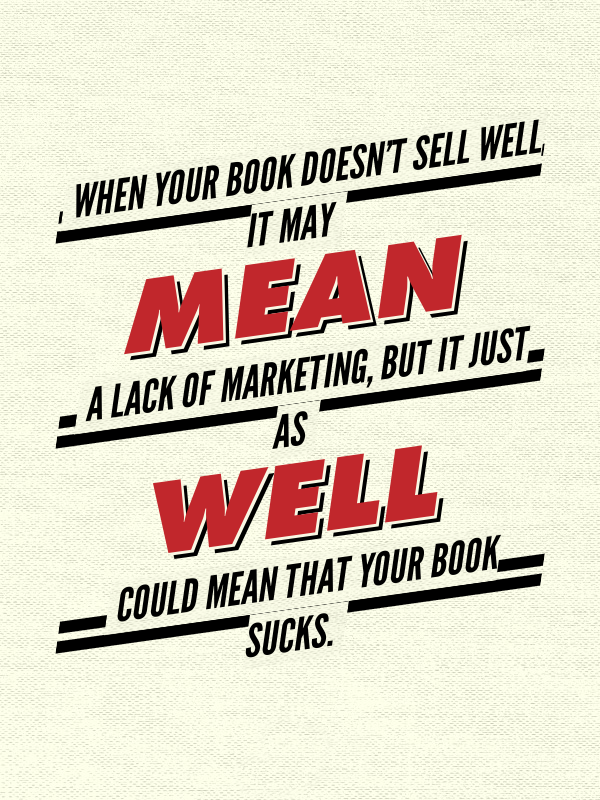3 Things Most Writers Should Stop Doing

 I’ve been a professional writer for zero years, so please pay attention when I tell you this: you probably need to stop doing the following three things.
I’ve been a professional writer for zero years, so please pay attention when I tell you this: you probably need to stop doing the following three things.
1. Stop listing your job as author or writer in social profiles unless you truly do make a living as an author or writer
I understand the desire to be perceived as a capital A Author. I also may even understand the fake-it-until-you-become it mentality. There’s a hope of perpetual perceptual motion when you start calling yourself a writer; eventually people around you see you as a writer which may even lead to legitimate writing gigs with legitimate money (not contributor copies).
But what you may be doing–without even realizing it–is an injustice to young writers who themselves want to be professionals one day. If new writers see you claiming to be a professional, they may interpret your likely paltry output (a novel here, a story there) as sufficient to earn a living wage. Eventually, these young writers will realize the near-impossibility of making a living wage as an author, but why unnecessarily perpetuate this false hope? Be honest. And in keeping with that mantra, know this about my writing life: I’ve made just under $3,000 dollars during my entire publishing history (almost 10 years). That’s about $300/year. It’s a good thing I have a real job to help support my family.
“But Caleb, I can still claim to be a professional writer even if I don’t get paid for doing it.” No you can’t. That’s not what “professional” means. But, there is something else about the money side of writing that you should probably stop doing…
2. Stop denouncing the importance of money as a success metric
I am so incredibly guilty of this.
While it’s true that money isn’t the sole metric of success (or even the best metric of success) it is the only metric that is reliable, common, and simple. Neither aesthetic nor literary value have a dependable metric associated with it. The fact is, we can’t universally measure the value of a work based on creative/emotional/artistic parameters. I wish we could. I’ve been trying for years. But until then we have sales figures.
Now, I know what you are thinking. “But marketing budgets often determine how successful–sales-wise–a book will be, so are you saying that we should measure books based on how much marketing they get?” This is a valid retort. So, perhaps more than sales figures we should look at profit to better understand value.
Profit is what is left after all other expenses, including marketing costs (in addition to the amount of the advance which I will use to account for factors like pre-existing platform and celebrity status; generally the more famous the celebrity the higher the advance). This means that, for example, if a book sells a lot but the marketing budget is also a lot then the profit metric indicates weak value. The ratio is not in the book’s favor. The publisher’s hope with marketing is that once people start reading and discussing a book then it will take on a life of it’s own, therefore diminishing the need for long-term marketing. This life of it’s own is what would, theoretically, increase profits thereby allowing profit to be a valid success metric. This life of it’s own is also indicative of word-of-mouth impact, which I think we can agree does have correlations with a book’s value.
Unfortunately, book publishers don’t disclose profit-by-book figures. So, we have to rely on general sales figures.
This is why I am a strong proponent for book award lists (National Book Award, Hugo Awards, Pulitzers,etc). These lists are created based on merit outside of sales figures. If a book makes one of these lists, the publisher basically gets free marketing which means an increase in sales. This puts the aforementioned ratio back in the book’s favor.
Sales figures don’t always speak to quality, but they sometimes do. It’s important for writers to understand that when your book doesn’t sell well it may mean a lack of marketing, but it just as well could mean that your book sucks.
3. Stop saying you “absolutely love” a magazine, journal, or publication if you don’t read it to the degree that someone who absolutely loves something would
If you do not subscribe to and tell all of your friends about a magazine then you do not absolutely love that magazine.
I’ve been a serial publication editor. I know well the gut-punch feeling of deceit as “readers” claim to love my magazine when I know for certain they don’t (not only can I surmise by the sales figures, but with a small enough publication an editor can verify individual subscribers). I did appreciate the verbal support of course, but that sort of support doesn’t cover a magazine’s overhead.
Often when I see writers comment about how they “absolutely love” a specific serial publication I assume they are simply trying to win points for eventual consideration of their own work to be published. I know a few writers in particular who absolutely love so many journals that 24 hour/day binge reading would be necessary in order to accurately reflect that love in real life.
Yes, it’s great to spread the name of a publication. It’s better to actually read the publication.
Many of my writer friends are guilty of the above. I am guilty as well. So know that my plea to stop doing these things comes only from a place of respect. Let me know if I’m way off here. Do you have other items to add to this list? Are there valid reasons to do any of the things above?


My first thought is that this post is incredibly hard. My second thought was that there’s a wicked amount of truth to it.
#1. If I look at my Facebook account, almost everyone on there has “writer” somewhere on the page. It’s overwhelming, to be honest. What else do these people do? For some reason, I want to know. I’m wondering if this point you’re making comes out of the recent article about writers being honest about where there money comes from. There are a number of writers out there who say they have “small side jobs” but live in awesome cities and travel all the time. Not fair, totally misleading to young people for sure.
#3. I definitely year you on this one. I have to admit that I don’t know anyone who actually reads a magazine or journal regularly. NOT ONE PERSON. Confess here, friends, if you do! You’ll be worshiped as a good person!!! I’ll also admit there are some magazines/journals that I do read, but I only read certain sections, like book reviews, but not fiction or poetry or interviews.
For #1, I’m mostly with you, though I tend to distinguish between “writer” (someone who writes) and “author” (someone who writes successfully). Also, I give a pass to the unemployed, because at that point, “unemployed, dead broke writer” is exactly as valid as “unemployed, dead broke software engineer” and makes you feel like a starving artist suffering for your craft rather than a loser with an advanced degree who can’t get a job.